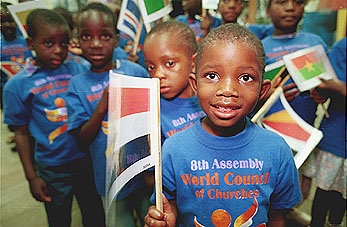Patricia Cruzado, 17, a child worker from Lima in Peru, began work selling cake on the
streets of Lima when she was eight. A year later, she joined the National Movement of
Organised Children and Adolescent Workers.
Now she has a message for concerned adults: "We don’t want adults to be sorry
for us and say, ‘Oh, the poor child workers!’ We want them to listen to us and
work with us so that children can work in a safe environment and live in dignity."
She told a padare at assembly that Lima has 1.3 million child workers, while another
million work in rural areas. "Many of them come from very poor families and some ...
live on the streets. They work so they can have food. If they don’t have food, they
die.
 She said some are
called independent workers, doing things like selling sweets, and many of
these children are domestics.
She said some are
called independent workers, doing things like selling sweets, and many of
these children are domestics.
And she was positive about it. "When I started work I felt a sense of joy. I was
showing my solidarity with my family. I was contributing to the family. It meant I
could buy my school uniform and things I needed for school."
Patricia began by going to school in the mornings and working until 5 in the evenings.
"Then I would go home to play with my friends and do my homework. Child workers
don’t have much time to play and enjoy their childhood. But we are still happy.
"We live in a culture of death. There is violence everywhere. We want to create a new
culture where children are no longer seen as problems but as people with rights and
dignity who can make a real contribution to our society."
These days Patricia works for half the day in a project organised by her movement. She is
one of 100 children and adolescents working in a municipal garden. They also propagate
trees which the council plants in streets and public places.
She said working had taught here some very valuable things. "It has taught me ethical
principals, how to live, how to accept responsibility. I have also learnt about other
children and their lives."
Patricia said she could put her philosophy simply: "We say ‘yes’ to work
with dignity, ‘no’ to exploitation. We say ‘yes’ to work where
children are protected, ‘no’ to mistreatment. We say ‘yes’ to work
that is recognised, ‘no’ to exclusion and marginalisation.
"There’s nothing wrong with work. ... God saw it was good. What is wrong is the
way children are exploited, beaten and sexually abused."
Back to top



She said some are called independent workers, doing things like selling sweets, and many of these children are domestics.
